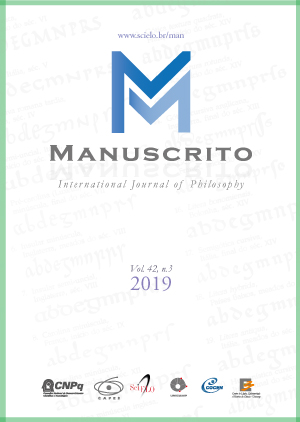Resumo
According to a widespread view, Thomas Kuhn’s model of scientific development would relegate rationality to a second plane, openly flirting with irrationalist positions. The intent of this article is to clarify this aspect of his thinking and refute this common interpretation. I begin by analysing the nature of values in Kuhn’s model and how they are connected to rationality. For Kuhn, a theory is chosen rationally when: i) the evaluation is based on values characteristic of science; ii) a theory is considered better the more it manifests these values; and iii) the scientist chooses the best-evaluated theory. The second part of this article deals with the thesis of the variability of values. According to Kuhn, the examples through which epistemic values are presented vary for each person, and for this reason individuals interpret these criteria differently. Consequently, two scientists, using the same values, can come to a rational disagreement over which theory to choose. Finally, I point out the limitations of this notion of rationality for the explanation of consensus formation, and the corresponding demand for a sociological theory that reconnects individual rationality with convergence of opinions.
Referências
BARNES, B., BLOOR, D. Relativism, rationalism and the sociology of knowledge. In M. Hollis and S. Lukes (eds.) (1982), pp. 201-60.
BLOOR, D. Knowledge and social imagery. Second edition. Chicago: University of Chicago Press, 1991.
CHEN, X., & JIANFENG, Z. Bayesian Test and Kuhn's paradigm. Frontiers of Philosophy in China, 1(3), pp. 491–505, 2006.
COHEN, R. S., LAUDAN, L. Physics, philosophy and psychoanalysis. Boston: Reidel, 1983.
D’AGOSTINO, F. Incommensurability and commensuration: the common denominator. Hampshire: Ashgate, 2003.
D’AGOSTINO, F. Kuhn’s risk-spreading argument and the organization of scientific communities. Episteme, 1(3), pp. 201-09, 2005.
_____ Naturalizing Epistemology: Thomas Kuhn and the “Essential Tension”. London: Palgrave Macmillan, 2010.
DE LANGHE, R. The problem of Kuhnian rationality. Philosophica, 86, pp. 11-31, 2012.
ELLIOTT, K. C. A Tapestry of values: an introduction to values in science. New York: Oxford University Press, 2017.
FAVRETTI, R. R., SANDRI, G., SCAZZIERI, R. Incommensurability and translation. Cheltenham, UK: Edward Elgar, pp. 33-37, 1999.
GOLDMAN, A., WHITCOMB, D. Social epistemology: essential readings. Oxford: Oxford University Press, 2011.
HACKETT, E. J., AMSTERDAMSKA, O., LYNCH, M., WAJCMAN, J. The handbook of science and technology studies. Third edition. Cambridge, MA: MIT Press, 2008.
HACKING, I. Scientific Revolutions. Oxford: Oxford University Press, 1981.
HEMPEL, C. Turns in the evolution of the problem of induction. Synthese, 46, pp. 389-404, 1981.
HEMPEL, C. Valuation and objectivity in science. In R. S. Cohen & L. Laudan (eds.) (1983), pp. 73-100.
HOLLIS, M., LUKES, S. Rationality and relativism. Oxford: Blackwell, 1982.
HOYNINGEN-HUENE, P. Reconstructing scientific revolutions. Chicago: Chicago University Press, 1993.
KITCHER, P. The advancement of science. Oxford: Oxford University Press, 1993.
KUHN, T. S. The structure of scientific revolutions. Chicago: Chicago University Press, 1962a/2012.
KUHN, T. S. Comment on the relations of science and art. In The Essential Tension. Chicago: CUP, 1969c/1977.
KUHN, T. S. Logic of discovery or psychology of research. In The Essential Tension. Chicago: CUP, 1970a/1977.
KUHN, T. S. Reflections on my critics. In The Road since Structure. Chicago: CUP, 1970b/2010.
KUHN, T. S. Postscript. In: The structure of scientific revolutions. Chicago: CUP, 1970c/2012.
KUHN, T. S. Preface. In: The essential tension. Chicago: CUP, 1977b/1977.
KUHN, T. S. Objectivity, value judgment, and theory choice. In: The essential tension. Chicago: CUP, 1977d/1977.
KUHN, T. S. Rationality and theory choice. In: The road since structure. Chicago: CUP, 1983d/2010.
KUHN, T. S. The road since structure. In: The road since structure. Chicago: CUP, 1991a/2010.
KUHN, T. S. Afterwords. In: The road since structure. Chicago: CUP, 1993a/2010.
KUHN, T. S. A physicist who became a historian for philosophical purposes: a discussion between Thomas S. Kuhn and Aristides Baltas, Kostas Gavroglu, and Vassili Kindi. In: The road since structure. Chicago: CUP, 1997/2010.
KUHN, T. S. Remarks on incommensurability and translation. In R. R. Favretti et al. (eds.) (1999), pp. 33-37.
KUUKKANEN, J-M. Kuhn, the correspondence theory of truth and coherentist epistemology. Studies in History and Philosophy of Science Part A, 38, pp. 555–566, 2007.
LACEY, H. Is there a significant distinction between cognitive and social values?. In: P. Machamer and G. Wolters (eds.) (2004), pp. 24-51.
LAKATOS, I. Falsification and the methodology of scientific research programmes. In: I. Lakatos and A. Musgrave, A. (eds.) (1970), pp. 91-196.
LAKATOS, I., MUSGRAVE, A. Criticism and the growth of knowledge. London: Cambridge University Press, 1970.
LAUDAN, L. Progress and its problems. Berkeley: University of California Press, 1978.
LAKATOS, I. A problem-solving approach to scientific progress. In I. Hacking (ed.) (1981), pp. 144-155.
LAKATOS, I. Kuhn’s critique of methodology. In J. Pitt (ed.) (1985), pp. 283-300.
MACHAMER, P., WOLTERS, G. Science, values and objectivity. Pittsburgh: Pittsburgh University Press, 2004.
MIZRAHI, M. The Kuhnian image of science. London: Rowman & Littlefield, 2019.
MODY, C., KAISER, D. Scientific training and the creation of scientific knowledge. In: Hackett, E. J.; Amsterdamska, O.; Lynch, M.; Wajcman, J. (eds.) (2008), pp. 377-402.
PITT, J. Change and progress in modern science. Reidel: Dordrecht, 1985.
SAVAGE, C. W. Scientific theories. Minneapolis: University of Minnesota Press, 1990.
SCHEFFLER, I. Science and subjectivity. Second edition. Indianapolis: Hackett Publishing Company, 1982.
SHAPERE, D. The structure of scientific revolutions. The Philosophical Review, 73(3), pp. 383-94, 1964.
SHAPIN, S. History of science and its sociological reconstructions. History of Science, 20(3), pp. 157– 211, 1982.
WITTGENSTEIN, L. Philosophical investigations. Basil: WileyBlackwell, 2009.
WORRALL, J. Scientific revolutions and scientific rationality: the case of the elderly holdout. C. W. Savage (ed.) (1990), pp. 319-54.
WRAY, B. K. Kuhn’s evolutionary social epistemology. Cambridge: Cambridge University Press, 2011.


